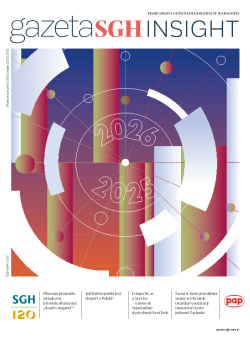Aktualny numer Gazety SGH
e-ISSN 1689-071X
INSIGHT (390) 2025/2026

Z satysfakcją oddaję w Państwa ręce – naszych Drogich Czytelników, członków wspólnoty akademickiej i interesariuszy zewnętrznych SGH – ósme wydanie corocznego specjalnego numeru Gazety SGH Insight. Publikacja ukazuje się na przełomie kolejnych lat, w formule zbioru eksperckich analiz i prognoz dotyczących kluczowych obszarów rynku oraz życia społeczno-gospodarczego, które zajmują istotne miejsce w działalności badawczej i dydaktycznej Szkoły Głównej Handlowej w Warszawie. W rok 2026 wchodzimy z optymizmem, ale także ze świadomością licznych wyzwań, skłaniających nas do rozważania różnych scenariuszy geopolitycznych. To z kolei wymaga oceny zdolności – zarówno organizacji, jak i ich pracowników – do adaptacji, sprawnego reagowania na zmiany i kryzysy, przy jednoczesnym utrzymaniu ciągłości działania, a nawet wykorzystaniu trudności jako szansy na rozwój i innowacje. To również czas, w którym otwarte jest pytanie, czy znajdujemy się w bańce spekulacyjnej AI, czy też coraz bardziej zaawansowane modele językowe realnie zmienią naszą pracę, naukę i życie społeczno-gospodarcze? Obie te perspektywy – geopolityczna oraz technologicznej transformacji – nakładają się na fundamenty wszystkich obszarów gospodarki i procesów, które analizujemy na łamach Gazety SGH Insight. W publikacji dokonujemy oceny roku 2025, stawiając prognozy na najbliższe miesiące, oraz formułujemy propozycje i postulaty kluczowe dla przyszłości poszczególnych sektorów gospodarczych.
Przygotowanie specjalnego, eksperckiego wydania Gazety SGH jest wyrazem otwartości uczelni na dialog z otoczeniem oraz dążenia do budowania z nim trwałych relacji. Jest to zatem odzwierciedlenie fundamentalnych wartości, którymi się kierujemy w naszej działalności. Na łamach Insighta prezentujemy opinie uznanych ekspertów – przedstawicieli środowiska akademickiego SGH, jednocześnie nadając publikacji formułę dostosowaną do zróżnicowanych oczekiwań odbiorców. Z treści skorzystają zarówno czytelnicy poszukujący syntetycznego ujęcia kluczowej wiedzy o mechanizmach globalnej gospodarki, jak i ci, którzy chcą zapoznać się z pogłębionymi i rzetelnie udokumentowanymi wynikami badań dotyczącymi najbardziej aktualnych wyzwań społeczno-ekonomicznych.
W tym roku redakcja Gazety SGH Insight zainicjowała współpracę z Polską Agencją Prasową, która część naszych analiz i prognoz w skróconej wersji opublikowała na przełomie 2025 i 2026 roku w swoim serwisie. PAP jest patronem medialnym 120-lecia Szkoły Głównej Handlowej w Warszawie.
Rekomendując lekturę Gazety SGH Insight, zapraszamy Państwa również do aktywnego udziału w dyskusji nad prezentowanymi problemami – poprzez dzielenie się opiniami, komentarzami oraz głosami polemicznymi. Wkład czytelników stanowi cenne uzupełnienie debaty nad najważniejszymi wyzwaniami współczesności.
Z życzeniami inspirującej lektury
DR MARCIN DĄBROWSKI



